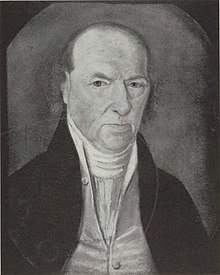
Back جون بلير، الابن Arabic جون بلير (محامى) ARZ جان بلایر جر. AZB John Blair junior German جان بلیر جونیور Persian John Blair (juge) French ג'ון בלייר HE John Blair Jr. ID ジョン・ブレア Japanese Ioannes Blair Latin
John Blair Jr. | |
|---|---|
 | |
| Associate Justice of the Supreme Court of the United States | |
| In office February 2, 1790 – October 25, 1795[1] | |
| Nominated by | George Washington |
| Preceded by | Seat established |
| Succeeded by | Samuel Chase |
| Member of the General Court and High Court of Chancery for Virginia | |
| In office 1777-1785 | |
| Member of the House of Burgesses from College of William and Mary, Colony of Virginia | |
| In office 1766-1770 | |
| Preceded by | Mann Page |
| Succeeded by | John Page |
| Personal details | |
| Born | April 17, 1732 Williamsburg, Virginia, British America |
| Died | August 31, 1800 (aged 68) Williamsburg, Virginia, U.S. |
| Political party | Federalist |
| Parent |
|
| Education | College of William & Mary (BA) Middle Temple |
| Signature | |
John Blair Jr. (April 17, 1732 – August 31, 1800) was an American Founding Father, who signed the United States Constitution as a delegate from Virginia and was appointed an Associate Justice on the first U.S. Supreme Court by George Washington.
A Virginia lawyer since 1757, Blair represented the College of William and Mary in the House of Burgesses (while his father served on the Governor's Council) and served in various colonial offices after giving up his local law practice. In the prelude to the American Revolutionary War, Blair had served as a commissioner of admiralty to enforce regulations promulgated by the Virginia Revolutionary Conventions, then on the committee that prepared the Virginia Declaration of Rights and the Virginia Constitution of 1776. He served for over a year on the Council of State before being appointed as one of the judges of the General Court, the new Commonwealth's first appellate court. He also served on the High Court of Chancery, which was a predecessor of the Virginia Court of Appeals (now the Virginia Supreme Court.[2] Blair was one of the best-trained jurists of his day. A widely respected legal scholar, he avoided the tumult of state politics, preferring to work behind the scenes. He was devoted to the idea of a permanent union of the newly independent states and was a loyal supporter of fellow Virginians James Madison and at the Constitutional Convention. While serving on the Supreme Court, he influenced the interpretation of the Constitution in a number of important decisions. Contemporaries praised Blair for his ability to penetrate to the heart of legal questions, as well as his gentleness and benevolence.
- ^ "Justices 1789 to Present". Washington, D.C.: Supreme Court of the United States. Retrieved 15 February 2022.
- ^ Van Horne, John C. "John Blair (ca. 1687–1771)". Encyclopedia Virginia. Retrieved 19 February 2022.